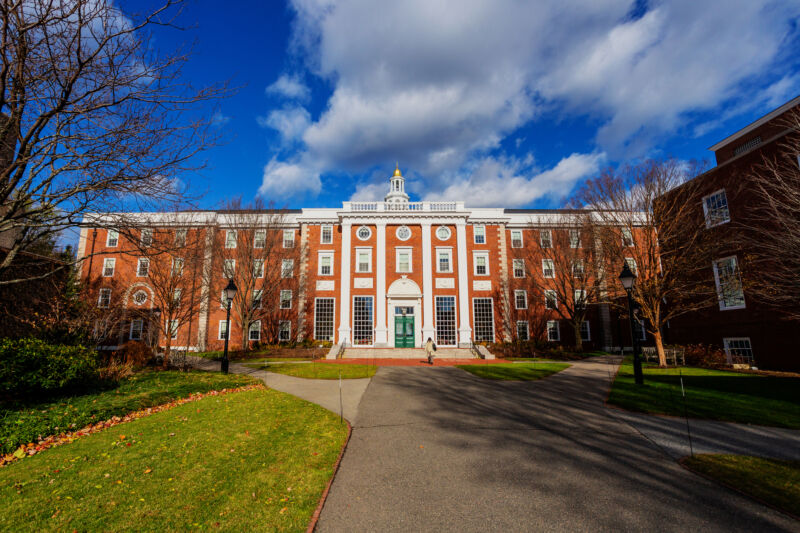
Earlier this year, we got a look at something unusual: the results of an internal investigation conducted by Harvard Business School that concluded one of its star faculty members had committed research misconduct. Normally, these reports are kept confidential, leaving questions regarding the methods and extent of data manipulations.
But in this case, the report became public because the researcher had filed a lawsuit that alleged defamation on the part of the team of data detectives that had first identified potential cases of fabricated data, as well as Harvard Business School itself. Now, the court has ruled on motions to dismiss the case. While the suit against Harvard will go on, the court has ruled that evidence-backed conclusions regarding fabricated data cannot constitute defamation—which is probably a very good thing for science.
Data and defamation
The researchers who had been sued, Uri Simonsohn, Leif Nelson, and Joe Simmons, run a blog called Data Colada where, among other things, they note cases of suspicious-looking data in the behavioral sciences. As we detailed in our earlier coverage, they published a series of blog posts describing an apparent case of fabricated data in four different papers published by the high-profile researcher Francesca Gino, a professor at Harvard Business School.
The researchers also submitted the evidence to Harvard, which ran its own investigation that included interviewing the researchers involved and examining many of the original data files behind the paper. In the end, Harvard determined that research misconduct had been committed, placed Gino on administrative leave and considered revoking her tenure. Harvard contacted the journals where the papers were published to inform them that the underlying data was unreliable.
Gino then filed suit alleging that Harvard had breached their contract with her, defamed her, and interfered with her relationship with the publisher of her books. She also added defamation accusations against the Data Colada team. Both Harvard and the Data Colada collective filed a motion to have all the actions dismissed, which brings us to this new decision.
Harvard got a mixed outcome. This appears to largely be the result that the Harvard Business School adopted a new and temporary policy for addressing research misconduct when the accusations against Gino came in. This, according to the court, leaves questions regarding whether the university had breached its contract with her.
However, most of the rest of the suit was dismissed. The judge ruled that the university informing Gino's colleagues that Gino had been placed on administrative leave does not constitute defamation. Nor do the notices requesting retractions sent to the journals where the papers were published. "I find the Retraction Notices amount 'only to a statement of [Harvard Business School]’s evolving, subjective view or interpretation of its investigation into inaccuracies in certain [data] contained in the articles,' rather than defamation," the judge decided.
Colada in the clear
More critically, the researchers had every allegation against them thrown out. Here, the fact that the accusations involved evidence-based conclusions, and were presented with typical scientific caution, ended up protecting the researchers.
The court cites precedent to note that “[s]cientific controversies must be settled by the methods of science rather than by the methods of litigation” and concludes that the material sent to Harvard "constitutes the Data Colada Defendants’ subjective interpretation of the facts available to them." Since it had already been determined that Gino was a public figure due to her high-profile academic career, this does not rise to the standard of defamation.
And, while the Data Colada team was pretty definitive in determining that data manipulation had taken place, its members were cautious about acknowledging that the evidence they had did not clearly indicate Gino was the one who had performed the manipulation.
Finally, it was striking that the researchers had protected themselves by providing links to the data sources they'd used to draw their conclusions. The decision cites a precedent that indicates "by providing hyperlinks to the relevant information, the articles enable readers to review the underlying information for themselves and reach their own conclusions."
So, overall, it appears that, by couching their accusations in the cautious language typical of scientific writing, the researchers ended up protecting themselves from accusations of defamation.
That's an important message for scientists in general. One of the striking developments of the last few years has been the development of online communities where scientists identify and discuss instances of image and data manipulation, some of which have ultimately resulted in retractions and other career consequences. Every now and again, these activities have resulted in threats of lawsuits against these researchers or journalists who report on the issue. Occasionally, suits get filed.
Ultimately, it's probably good for the scientific record that these suits are unlikely to succeed.